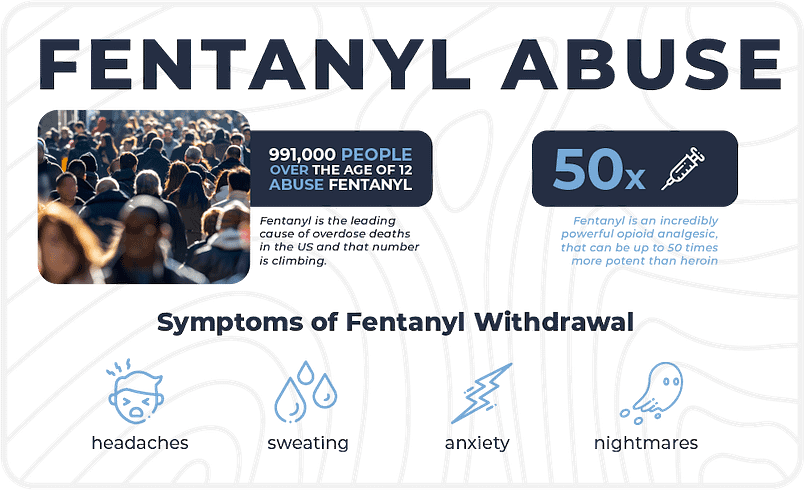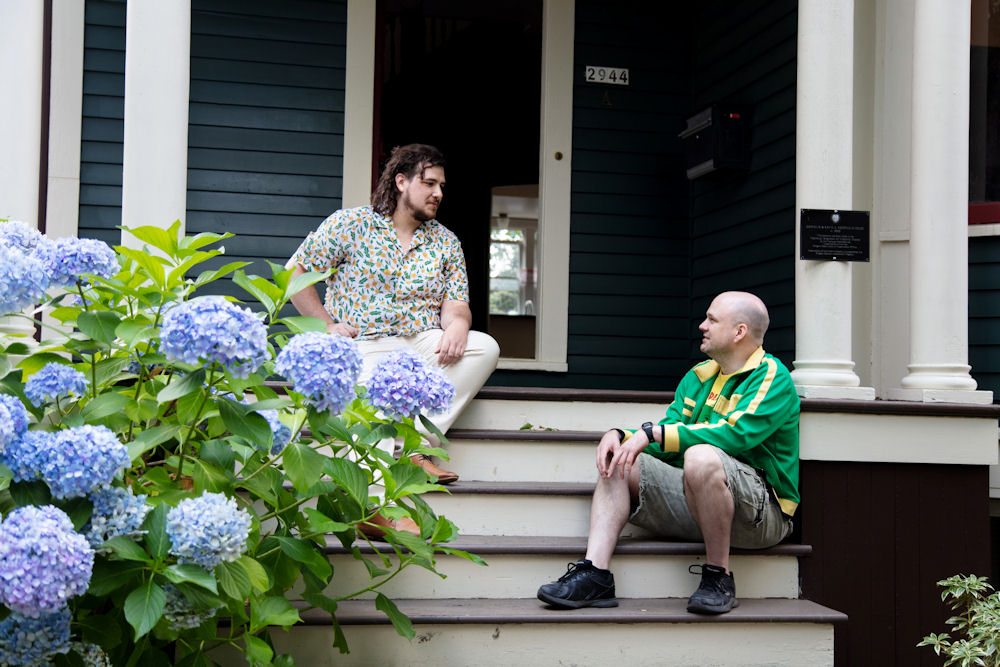If you or your loved one is battling fentanyl addiction, a combination of substance use treatment programs at Crestview Recovery can give you the tools that you may need to overcome your dependence on fentanyl. Crestview Recovery offers treatment in Portland, Oregon, for clients struggling with addiction, a primary mental health condition, or a dual diagnosis.

Healing Begins Here
WHAT IS FENTANYL?
Common street names for this drug include Jackpot, Dance Fever, or Apache. Fentanyl is highly abused since it causes an extremely strong high compared to other opioids. It’s frequently added to other illegal drugs, often without the buyer’s knowledge or consent. It’s a common factor behind overdoses, since the person consuming the drugs isn’t accounting for the presence of the very strong fentanyl. The amount of fentanyl required to cause an overdose in a normal adult is the size of a few grains of salt.
If you or your loved one can’t seem to control their fentanyl addiction, then it’s important to get them help as soon as possible. Withdrawal symptoms of opioid addiction can be extremely uncomfortable and even physically dangerous. Medical supervision is advised for people looking to heal from opioid addiction.

Signs of Fentanyl Withdrawal
Fentanyl addiction requires professional intervention and is best treated through a comprehensive addiction treatment program that addresses both the physical and psychological aspects of the condition.
Recognizing the signs of fentanyl abuse is crucial in preventing further harm, as fentanyl is a potent opioid. Because fentanyl is significantly stronger than other opioids, even a slight misuse can cause dangerous side effects. Common symptoms of fentanyl abuse include:
- Rapid heartbeat
- Chest tightness or pain
- Hallucinations
- Severe mood swings
- Poor coordination and balance
- Pounding in the ears
- Mental confusion
- Drowsiness or extreme fatigue
- High blood pressure
- Nausea
- Cold sweats
- Diarrhea
- Fever
The most dangerous symptom of fentanyl misuse is respiratory depression, where breathing slows to dangerously low levels. This can potentially lead to a fatal overdose if not addressed immediately.
A fentanyl overdose is a medical emergency. Signs of a fentanyl overdose include extreme drowsiness, slow or shallow breathing, blue lips or fingertips, and loss of consciousness. Administering Narcan (naloxone), an opioid overdose reversal drug, can temporarily restore breathing while waiting for emergency medical help. It’s important to call 911 immediately in any overdose situation.
Fentanyl withdrawal can be particularly intense due to the drug’s potency and how it affects the brain’s opioid receptors. Fentanyl withdrawal symptoms typically begin within hours of the last dose and can include:
- Severe muscle aches and pains
- Nausea and vomiting
- Anxiety and agitation
- Restlessness and insomnia
- Sweating and chills
- Diarrhea
- Intense cravings
These symptoms can be incredibly challenging to endure without professional help, which is why medication-assisted treatment (MAT) is often used in fentanyl addiction recovery to ease withdrawal symptoms and reduce cravings. At Crestview Recovery, our addiction treatment programs provide a safe, supportive environment where individuals can detox and begin their journey to long-term recovery.
What to Expect in Fentanyl Rehab

For those struggling with severe fentanyl addiction, residential treatment provides a structured and supportive environment where individuals can fully focus on recovery. Residential treatment is also referred to as inpatient rehab for fentanyl addiction. Crestview Recovery’s residential treatment program in Portland offers round-the-clock care from experienced medical professionals and addiction specialists. In this setting, patients can undergo medically assisted detox, participate in therapy, and participate in group activities designed to support healing from addiction.
Residential treatment is considered ideal for those with long-term fentanyl abuse or individuals at high risk for relapse. It removes them from triggers and distractions, allowing them to fully immerse themselves in recovery.
Medication-assisted treatment (MAT) is a key component in treating fentanyl addiction at Crestview Recovery. MAT combines FDA-approved medications with behavioral therapy to help manage withdrawal symptoms and reduce cravings. Medications like methadone and buprenorphine bind to the body’s opioid receptors, easing withdrawal and helping individuals taper off fentanyl safely. Naltrexone is another FDA-approved medication used in MAT for fentanyl addiction.
MAT helps to reduce the risk of relapse and overdose by blocking the euphoric effects of fentanyl and other opioids. At Crestview Recovery, MAT is always tailored to each individual’s unique needs to ensure that treatment is safe and effective.
For individuals who need flexibility in their recovery journey, Crestview Recovery offers a variety of outpatient treatment options. Our intensive outpatient program (IOP) and partial hospitalization program (PHP) allow for individuals to receive high-quality care while maintaining responsibilities at home, work, or school. These programs are ideal for individuals with less severe addictions or who are transitioning out of inpatient treatment.
During outpatient treatment, individuals engage in therapy sessions, group counseling, and receive continued medical support. Crestview Recovery’s outpatient services are designed to provide structure and
Recovery doesn’t end when a patient completes treatment. At Crestview Recovery, we offer comprehensive aftercare and sober living options to ensure long-term success. Our aftercare program includes ongoing therapy, support groups, and relapse prevention strategies that help individuals stay connected to their recovery community.
For those who need additional structure, sober living homes provide a safe, drug-free environment where individuals can continue to build their new lives free from addiction. The supportive atmosphere fosters accountability and encourages residents to develop healthy habits while adjusting to life outside of rehab.
 At the core of Crestview Recovery’s approach to fentanyl rehab is a range of evidence-based therapies designed to address the emotional and psychological aspects of addiction. Our treatment includes:
At the core of Crestview Recovery’s approach to fentanyl rehab is a range of evidence-based therapies designed to address the emotional and psychological aspects of addiction. Our treatment includes:
- Cognitive-behavioral therapy (CBT): Helps individuals recognize and change negative thought patterns that lead to substance use.
- Mindfulness meditation therapy: Teaches patients how to manage stress and cravings by staying grounded in the present moment.
- Dialectical behavior therapy (DBT): Focuses on emotional regulation, distress tolerance, and developing coping strategies.
- Individual therapy: One-on-one sessions with a mental health professional help individuals to explore personal challenges and trauma.
- Family therapy: Involves loved ones in the recovery process, helping to heal relationships and build a home environment that supports sobriety.
- Group therapies: Allow individuals to connect with others facing similar struggles and gain support through shared experiences.
Crestview Recovery also incorporates a 12-step program to provide a community-focused, peer-driven approach to healing.
Why Choose Crestview Recovery
We understand that your needs are unique, and that addiction shows up in everyone differently. We tailor our addiction treatment programs to suit your specific expectations. Individualized care is a key feature of our approach, ensuring that each patient receives a treatment plan designed just for them. Our focus is on making each of our patients feel comfortable and safe throughout the treatment.


Get Help for Fentanyl Addiction at Crestview Recovery in Portland
Don’t wait to start building a life free of addiction. Reach out to the Crestview Recovery team today for more information on how we can help.
FENTANYL REHAB FAQ
Yes, fentanyl misuse can easily lead to overdose due to its potency. Fentanyl is often found in illicitly manufactured pills and powders, which makes it difficult to know the exact dose being consumed. An overdose occurs when the drug overwhelms the body’s opioid receptors, slowing or stopping breathing, which can result in death if not treated immediately.
A fentanyl overdose is a medical emergency. Signs of a fentanyl overdose include extreme drowsiness, slow or shallow breathing, blue lips or fingertips, and loss of consciousness. Administering Narcan (naloxone), an opioid overdose reversal drug, can temporarily restore breathing while waiting for emergency medical help. It’s important to call 911 immediately in any overdose situation.
Yes, fentanyl is much more dangerous than most other opioids due to its high potency. Even small amounts can lead to overdose, especially if mixed with drugs like heroin or alcohol. Illicitly manufactured fentanyl is often mixed with other substances without the user’s knowledge, increasing the risk of overdose deaths.
Yes, fentanyl addiction can be treated through a combination of medical and therapeutic interventions. With the right support, including medication-assisted treatment, individual and group therapies, and a supportive recovery environment, individuals can achieve long-term recovery. Crestview Recovery provides a range of treatment options to help people recover from fentanyl and substance use disorders.





















